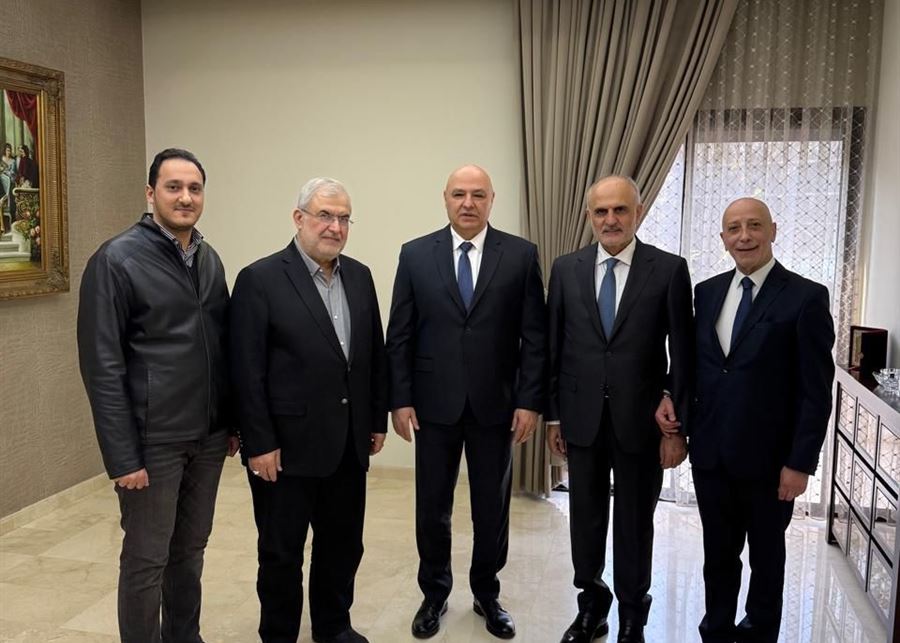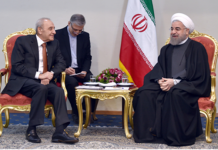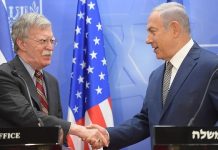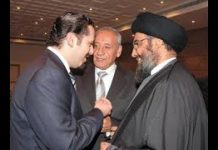Joseph Aoun: Get Out! Resign
Hisham Bou Nassif/Nidaa Al-Watan/September 29, 2025 (Translated From Arabic Freely by the LCCC Editor)
جوزيف عون: ارحل
هشام بو ناصيف/نداء الوطن/29 أيلول/2025
البيان الذي صدر عن وزارة الدفاع اللبنانيّة بعد حادثة الروشة مفصليّ باللحظة السياسيّة الراهنة، وبتاريخ العلاقات المدنيّة – العسكريّة بلبنان. قرّر البيان أنّ مهمّة الجيش “درء الفتنة ومنع انزلاق الوضع إلى مهاوي التصادم وردع المتطاولين على السلم الأهلي وترسيخ دعائم الوحدة الوطنيّة”. وإذ أسف لـ “نكران الجميل” و “التحامل” و “إلقاء تبعات الشارع على حماة الشرعيّة”، أكّد البيان أنّ للجيش “رئيسًا يرعاه وقائدًا يسهر عليه وشعبًا يحبّه ويرى فيه الأمل الباقي بعد اللّه ولبنان”.
من الصعب حشو كميّة كبرى من الهراء بعدد أقلّ من الكلمات. لا، “الشعب” لا يرى في الجيش مصدر الأمل بعد اللّه ولبنان، بل يرى فيه المؤسّسة التي وقّع قائدها إميل البستاني على اتّفاق العار بالقاهرة عام 1969 على أمل أن يصل هو إلى رئاسة الجمهوريّة، أو أن يعود فؤاد شهاب إليها. ثمّ إنّ الجيش انخرط بحرب الإلغاء بالمنطقة الشرقيّة؛ وتكيّفت قيادته دون صعوبة مع الاحتلال السوري لاحقًا يوم قست مخابراته بالتسعينات على الطلّاب السياديّين الذين رفضوا القبول بالاحتلال؛ كما تكيّف الجيش بعد ذلك وحتّى اليوم مع سيطرة الميليشيا الشيعيّة على البلاد، ودائمًا بدون صعوبة أو احتكاك معها. خيلاء العسكريتاريا التي تزيّن لنفسها أنّ اللبنانيّين يضعون الجيش “بعد اللّه ولبنان” خفّة فكريّة جديرة تمامًا بعسكر دول العالم الثالث.
ومع ذلك، المسألة ليست هنا. المسألة أنّ بيان وزارة الدفاع انقلابي على الشرعيّة والدستور. والحال أنّ الانقلابات لا تعني دومًا أرتالًا من الدبّابات تتوجّه لاحتلال قصر جمهوري. هناك انقلابات مخمليّة (Velvet Coups) تحصل دون ضربة كفّ واحدة عندما تقرّر العسكريتاريا التخفّف من أحكام الدستور. استطرادًا: الانقلابات لا تعني بالضرورة أن يقبض معارض من خارج النظام على الحكم فيه. هناك ما يسمّى بـ “الانقلاب الذاتي” (Autogolpe) وجوهره أن تقوم جهة من داخل الحكم، وصلت إليه بطريقة شرعيّة، باستعمال مفاصله لتفكيك الشرعيّة. بالعمق، هذا ما فعلته وزارة الدفاع اللبنانيّة ببيانها الأخير.
لماذا؟ أوّلًا، لأنّها حدّدت للجيش مهمّة سياسيّة هي حماية “الوحدة الوطنيّة”، وهذا من شيم العسكر الانقلابي بدول العالم الثالث. مثلًا، العسكر التركي أوكل لنفسه بما مضى مهمّة حماية العلمنة. جيوش أميركا اللاتينيّة كانت تعطي لنفسها مهمّة ضرب اليسار، ولو صوّت المواطنون له. بالمقابل، بالدول الديمقراطيّة، لا مهمّة سياسيّة للجيش؛ وظيفته حصرًا تطبيق أوامر السلطة التنفيذيّة. نقطة على السطر. من لا تعجبه الأوامر من العسكر يحقّ له أن يستقيل، ولكن لا رأي للعسكر كعسكر بسياسة بلادهم. واضح من بيان وزارة الدفاع اللبنانيّة أنّها تمنح نفسها حقّ التفكير بأيّ أوامر تحبّ تطبيقها، وأيّ ترفضها باعتبارها تتعارض مع حماية “الوحدة الوطنيّة”، أي مع المهمّة السياسيّة التي حدّدتها لنفسها من خارج الدستور. هذا انقلاب مخمليّ.
ثانيًا، واضح من بيان وزارة الدفاع أنّها ترى أنّ تعليمات الجيش تأتي من رئاسة الجمهوريّة، ومن قيادته. كان لافتًا جدًّا غياب الإشارة إلى مجلس الوزراء بالبيان، دع عنك أنّه مصدر السلطة التنفيذيّة بحسب دستور اتّفاق الطائف. بوضوح شديد: مجلس الوزراء، عبر رئيسه، أعطى تعليمات هي من صميم صلاحيّاته الدستوريّة، فقرّر قادة القوى الأمنيّة الذين وصلوا لمواقعهم بحسب الأصول الدستوريّة أنّ الدستور لا يعنيهم، ولا، تاليًا، تعليمات رئيس مجلس الوزراء. هذا انقلاب ذاتيّ.
جوزيف عون مسؤول مباشرة عن كلّ ما سبق لأنّه اختار وزير الدفاع، وقائد الجيش، شخصيًّا. الانتقادات التي طالت هذا وذاك بالأيّام الأخيرة بعد أحداث الروشة محقّة، شرط ألّا ينسى أحد أنّ وزير الدفاع وقائد الجيش حليفا جوزيف عون. هو مسؤول تاليًا عن حركتهما السياسيّة. أن يكونا تورّطا مع نبيه برّي، والميليشيا الشيعيّة، ضدّ رئيس مجلس الوزراء، وضدّ أمل اللبنانيّين بألّا تظلّ دولتهم فاشلة، ومستسلمة لميليشيا أصوليّة، يعني بالسياسة أنّ جوزيف عون نفسه قد تورّط.
سرديّة وزارة الدفاع أنّها تفعل ما تفعله لدرء الفتنة مردودة لجوزيف عون، ولميشال منسّى، ولرودولف هيكل. حسن نصراللّه متّهم في الوعي الشعبي بقتل رفيق الحريري، زعيم سنّة بيروت؛ وها “حزب” نصراللّه يحيي ذكراه ببيروت، وبمكان غير بعيد من موقع اغتيال الحريري. أيّ استفزاز للسنّة أكبر من هذا؟ بل أيّ استفزاز لكلّ لبناني غير متواطئ مع الميليشيا الشيعيّة؟ انسحاب الجيش من المشهد ليس حماية للبلاد من الفتنة بل تعبيدًا لطريقها.
والحال أنّ حصاد اللبنانيّين مع جوزيف عون بات مرًّا. إميل لحّود فعل ما فعله يوم كان رئيسًا، ولكنّه لم يهدر فرصة دوليّة معطاة للبنان لأنّها لم تكن موجودة. جوزيف عون بالمقابل يهدر فرصة اهتمام دولي بلبنان قد لا تتكرّر لعقود. وإن كان جوزيف عون يظنّ أنّ اللبنانيّين لم ينتبهوا أنّ دونالد ترامب التقى أحمد الشرع بنيويورك، ولم يلتقه هو، فهو مخطئ. عجز جوزيف عون عن تجريد ميليشيا الشيعة من سلاحها يحجز لاسمه مكانًا على لائحة عليها أيضًا أسماء الموقّعين على اتّفاقيّة القاهرة، والاتّفاق الثلاثي، فضلًا طبعًا عن أسماء من لم يوقّعوا على اتّفاقيّة 17 أيّار. ومن لم يتصرّف كما كان يليق به أن يتصرّف بسنته الرئاسيّة الأولى، بعزّ الزخم، والأمل به، والدعم الدولي، فلن يتصّرف بشكل أفضل بسنوات العهد الباقية. ليته يرحل.
وإن لم يفعل، ينبغِ لكلّ رافض لسيطرة السلاح الشيعي على لبنان أن يعي أنّ المواجهة مع السلاح تعني بالضرورة المواجهة السياسيّة مع حماته. وقد صار واضحًا أنّ جوزيف عون منهم.
Joseph Aoun: Get Out! Resign
Hisham Bou Nassif/Nidaa Al-Watan/September 29, 2025 (Translated From Arabic Freely by the LCCC Editor)
The statement issued by the Lebanese Ministry of Defense after the Raouché incident is pivotal in the current political moment and in the history of civil-military relations in Lebanon. The statement declared that the army’s mission is “to ward off strife, prevent the situation from sliding into the abyss of confrontation, deter those who encroach upon civil peace, and consolidate the foundations of national unity.” While lamenting “ingratitude,” “bias,” and “placing the burden of the streets on the protectors of legitimacy,” the statement affirmed that the army “has a President who protects it, a Commander who watches over it, and a people who love it and see in it the last remaining hope after God and Lebanon.”
It is hard to cram a greater amount of nonsense into fewer words. No, the “people” do not see in the army a source of hope after God and Lebanon. Rather, they see in it the institution whose Commander, Emile Bustani, signed the infamous Cairo Agreement of 1969 in the hope of becoming President, or of restoring Fouad Chehab to the presidency. They see in it the army that engaged in the “War of Elimination” in the eastern region; whose leadership adapted without difficulty to the subsequent Syrian occupation, at a time when its intelligence services in the 1990s harshly persecuted sovereignist students who refused to accept that occupation; and the same army that later—and up to the present day—has accommodated itself, again without difficulty or friction, to the domination of the Shiite militia over the country.
The arrogance of militarism, imagining that the Lebanese place the army “after God and Lebanon,” is an intellectual frivolity entirely worthy of third-world armies. And yet, the issue is not here. The issue is that the statement of the Ministry of Defense is a coup against legitimacy and the constitution. Coups do not always mean columns of tanks heading to occupy a presidential palace. There are “Velvet Coups” that occur without a single slap when the militaria decides to shed the restraints of the constitution.
Furthermore, coups do not necessarily mean that an outsider seizes power. There is what is called an autogolpe (self-coup), whose essence is that a party within the system, having reached its position legally, uses its powers to dismantle legitimacy from within. In depth, this is exactly what the Lebanese Ministry of Defense has done with its recent statement.
Why? First, because it assigned to the army a political mission: the protection of “national unity.” This is the hallmark of coup-driven militaries in the Third World. For example, the Turkish military once assigned itself the mission of defending secularism. The armies of Latin America used to claim the mission of crushing the left, even if citizens had voted for it. By contrast, in democratic states, the army has no political role whatsoever; its function is exclusively to carry out the orders of the executive authority. Full stop. If officers dislike the orders, they can resign, but the military as such has no right to interfere in national politics. From the Defense Ministry’s statement, it is clear that it is granting itself the right to decide which orders it wishes to execute and which to reject on the grounds of “protecting national unity”—that is, on the basis of a political mission it has invented for itself outside the constitution. That is a velvet coup.
Second, it is clear from the statement that the Ministry of Defense views the army’s instructions as coming from the Presidency and the Commander. What was striking was the total absence of any reference to the Council of Ministers, which, under the Taif Constitution, is the source of executive authority. Very plainly: the Council of Ministers, through its head, issued directives squarely within its constitutional prerogatives; the leaders of the security forces, who reached their positions according to constitutional procedures, decided that the constitution does not concern them—and therefore neither do the orders of the Prime Minister. That is a self-coup.
Joseph Aoun is directly responsible for all of this because he personally chose both the Minister of Defense and the Army Commander. The criticisms directed at both of them in recent days after the Raouché events are valid, provided no one forgets that the Minister and the Commander are Joseph Aoun’s allies. He is therefore politically responsible for their actions. That they colluded with Nabih Berri and the Shiite militia against the Prime Minister—and against the hopes of the Lebanese that their state would not remain failed and surrendered to a fundamentalist militia—means politically that Joseph Aoun himself is complicit.
The Ministry of Defense’s narrative that it acted to “avert strife” is a claim that rebounds directly against Joseph Aoun, Michel Menssa, and Rodolphe Haikal. Hassan Nasrallah is accused in the public consciousness of assassinating Rafik Hariri, the leader of Beirut’s Sunnis. And here is Nasrallah’s “party” commemorating him in Beirut, not far from the very site of Hariri’s assassination. What greater provocation to the Sunnis than this? What greater provocation to any Lebanese who is not complicit with the Shiite militia? The army’s withdrawal from the scene was not protecting the country from strife—it was paving the way for it.
The Lebanese harvest under Joseph Aoun has become bitter. Émile Lahoud did what he did when he was president, but he did not waste an international opportunity for Lebanon, because none was on offer. Joseph Aoun, by contrast, is squandering an international moment of attention toward Lebanon that may not be repeated for decades. And if Joseph Aoun believes the Lebanese did not notice that Donald Trump met Ahmad al-Sharaa in New York, and not him, then he is mistaken. His failure to disarm the Shiite militia secures his place on the list that already includes the signatories of the Cairo Agreement, the Tripartite Agreement, and of course those who refused to sign the May 17 Agreement. And whoever failed to act as he should have during his first presidential year, when momentum, hope, and international support were at their peak, will not act better in the remaining years of his term. If only he would leave.
If he does not, then every Lebanese who rejects Shiite militia control over Lebanon must realize that confronting the militia’s weapons necessarily means confronting their political protectors. And it has now become clear that Joseph Aoun is one of them.






















